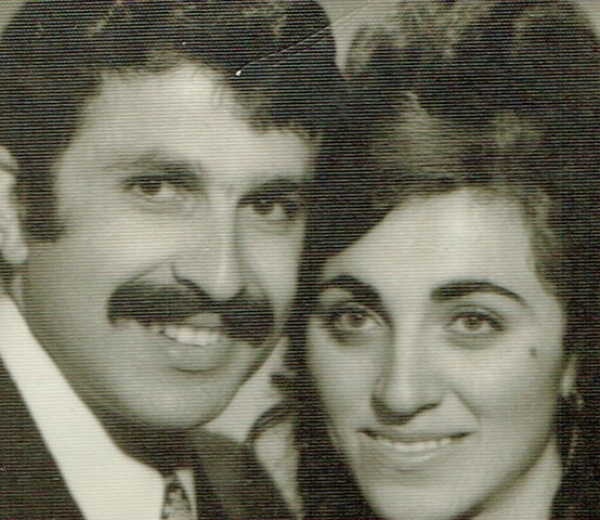Sesede Terziyan
Submitted by global publisher on Tue, 07/14/2015 - 16:40
English
Intro:
“It might not be a coincidence that I carry the name Sesede,” she says with a sparkle in her eyes. “It’s such a perfect fit to describe my journey through life. After all, Sesede means ‘raise your voice’ in Turkish.”
Weight:
-70
Story elements:
Text:
“It might not be a coincidence that I carry the name Sesede,” she says with a sparkle in her eyes. “It’s such a perfect fit to describe my journey through life. After all, Sesede means ‘raise your voice’ in Turkish.”
Text:
It is the year 1923. The Armenian Genocide in the Ottoman Empire just ended, costing 1.5 million Armenian lives. A small number of Christians still refuse to leave their home country, Garabed Terziyan among them. After his forced conscription and deployment, he returns to his hometown of Yozgat. Of the 30,000 Armenians who lived there at the time, only 88 are left after the deportations of 1915.
Image:
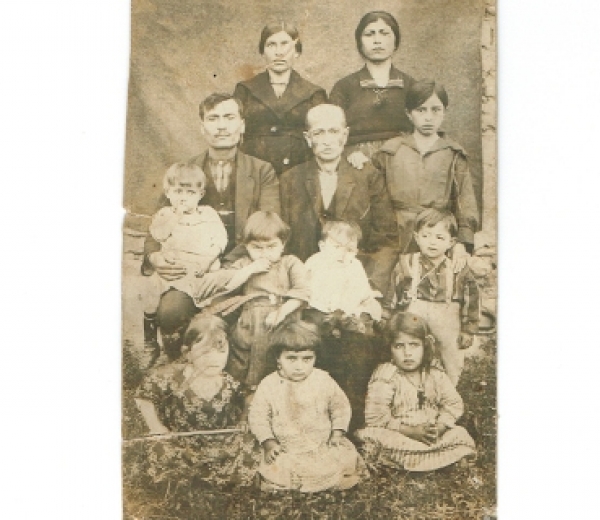
Text:
Garabed Terziyan holding his six-month-old son Aram
The massive emigration of his fellow countrymen from Turkey and the abrogation of the Treaty of Sèvres have Garabed worried, but he finds consolation in the fact that the Treaty of Lausanne promises Armenians and Greeks some minority rights. He had fallen in love with a young woman who shared his fate – she, too, had lost all her relatives except for one brother. Garabed wants to be with her and to start a family despite the great age disparity. He remains optimistic.
Although Garabed is past the peak of his life, he marries young Mariam and has two children with her, but he will not live to see his children grow up. He dies shortly after the birth of his son in 1922, without having provided his family with financial security.
Mariam’s financial strain and the rising nationalism in Turkey induce her to marry a Turk. The ongoing destruction of Armenian churches, schools and cemeteries frightens her. She hopes that her marriage will secure her own existence and that of her children. Until the day she dies, this decision will cloud her relationship with her son, who cannot forgive his mother.
The Stepfather and the Surname Law – The 1930s
Ten years go by and Mustafa Kemal passes the Surname Law of 1934, stipulating that from now on every citizen of Turkey must have a last name that corresponds to a word listed in the Turkish dictionary. Twelve-year-old Aram’s last name is changed from Terziyan to Terzioglu. His stepfather had put pressure on his mother and sister to convert to Islam and changed his sister’s name from Armenian Shushanik to Turkish Nurdane.
Aram dislikes his despotic stepfather strongly. When the latter once again seeks to convert Aram to Islam, he leaves home for good and finds shelter with his uncle. He earns a living by selling newspapers, cutting hair for money or barter, pulling teeth and making bricks. He learns to hide his origins in order not to make enemies of his peers, because history books depict Armenians as traitors.
Image:
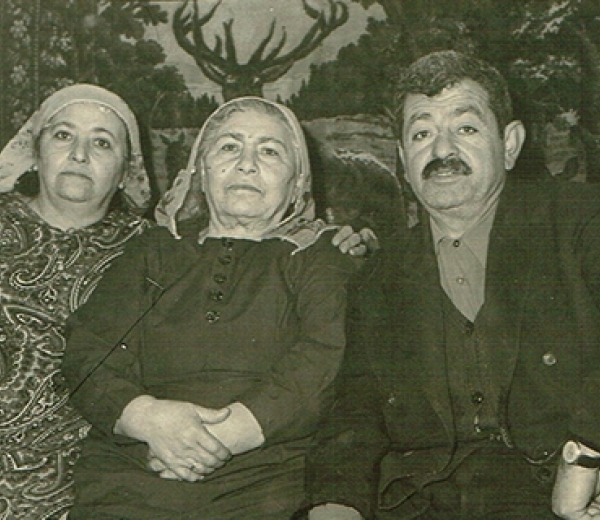
Text:
Aram with his mother and sister
Aram’s faith and strong will help him grow up to be the most important person in Sorgun, the second-largest city in the province of Yozgat. Seventy years ago, Sorgun was a several thousand year-old city in decay that began to flourish culturally thanks to Aram. Today the city is a popular vacation resort.
Aram Terzioglu and His Children
It is the year 1951 and Aram has a great reputation in Sorgun.
Years later, his contribution to his hometown will be duly noted in history books.
In his mid-20s, he is married to beautiful Sesede and has two sons, Garbis and Nuran. In addition to numerous shops, Aram runs a private movie theater and owns a big house, which will be filled with even more life when his other children Sevinc, Nuran, Nuray, and Suna are born.
Image:
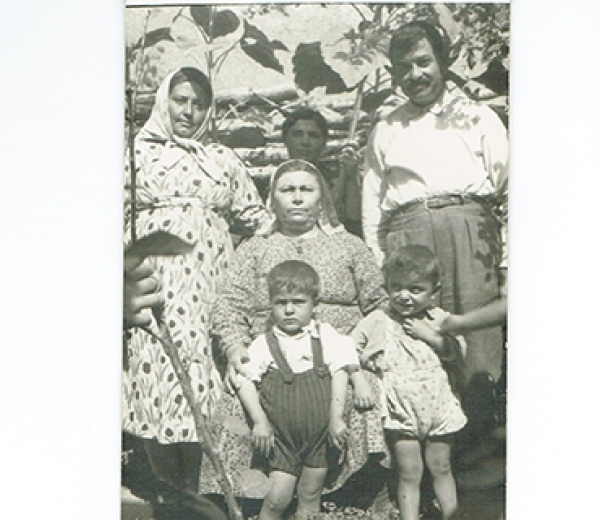
Text:
Aram with his wife Sesede, his sister, his mother and his son Nuray
Aram and Sesede do not speak Armenian. Their parents had refrained from teaching them Armenian because they feared for their safety. Years later, Aram’s little stepsister will remember: “When we would play outside, we were not allowed to call Aram’s older son Garbis by his name because it was too dangerous. We simply called him Ali.”
The City of Sorgun – The 1970s
It is late at night. A sharp knock on the door jerks Nuran out of his sleep. “Nuran, hurry up! You need to come with us immediately,” a neighbor screams at the top of her lungs. Nuran runs to the movie theater, which he took over from his father a few years ago. The building is ablaze. The beautiful French films he brought with him from Ankara, the film archive of the last 20 years, all turn to ashes before his very eyes.
Nuran runs out of patience. When Greeks and Armenians are brutally beaten in Istanbul in 1955, he no longer sees a future for himself and his children in this country. His brother Nuray had already moved to Germany sometime ago.
He had tried to make Aram change his mind about leaving several times so as not to leave him behind alone. “If they have a problem let them go,” Aram cut him off. “This is my country. This is where I was born and where I will die.”
Image:
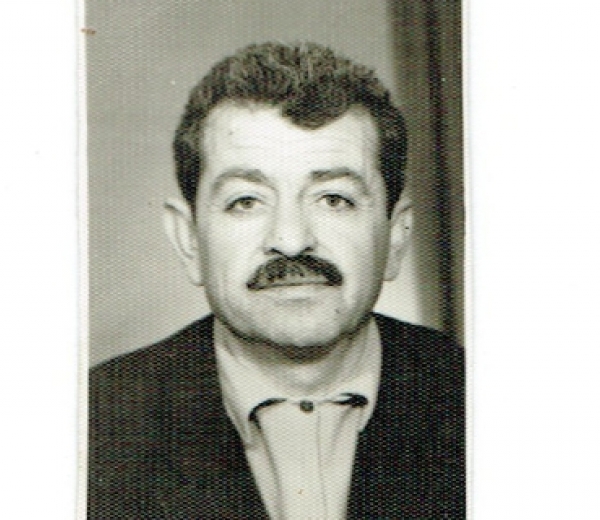
Text:
Aram in the 1970s
The Village of Ruhwarden – The 1980s
The Terzioglus pass through Austria before arriving in Germany. After an odyssey from one refugee camp to another, they are eventually sent to the village of Ruhwarden in the state of Lower Saxony in the northwest. They are assigned a place to live in a redbrick house, which they share with other families. Their third child is born there and they name her Sesede, after Nuran’s mother.
But even in Germany Nuran is denied some rights – as an asylum seeker he is not allowed to travel or work. Accustomed to working all his life, Nuran fights for the right to work in court, eventually winning his guest worker status eight years later. For the first time in all these years, the family leaves the state of Lower Saxony and moves to Baden-Württemberg in the southwest, where Nuran has found himself a job. Later the same year they also travel to Sorgun.
“I’m so happy that I had the chance to meet my grandparents,” says their granddaughter Sesede.
She was eight years old when she met Aram for the first time. “When my grandfather died, my father went to Turkey to make funeral arrangements. He returned forty days later, looked at me for a long time and said, ‘Sesede, my child, I have lost my home.’”
These words were imprinted in Sesede’s memory. As time goes by, she learns more about her ancestors’ history and the reasons for their emigration. She has a lot of questions, which she expresses in her music and on the stage. At the beginning of her career as an actress Sesede reassumes her Armenian surname, delves into her family’s history and tells it on the stage. “It might not be a coincidence that I carry the name Sesede,” she says with a sparkle in her eyes. “It’s such a perfect fit to describe my journey through life. After all, Sesede means ‘raise your voice’ in Turkish.”
Today Sesede is a successful stage and film actress, starring in several episodes of the critically acclaimed German prime time TV series “Tatort” (Crime Scene).
To learn more about Sesede, click here.
The story is verified by the 100 LIVES Research Team.
Subtitle:
The life story of Aram Terziyan told by his granddaughter Sesede
Story number:
33
Author:
Irina Lamp
Header image:
